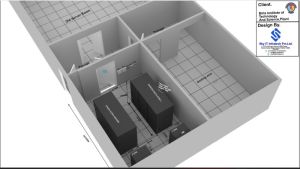
data center engineering
100,000 - 500,000 Per Site
1 Site (MOQ)
Designing a data center architecture is a complex task that involves multiple aspects, including the physical infrastructure, networking, security, and scalability. Here's an overview of the key components and considerations when designing a data center architecture: Location and Site Selection: Choose an appropriate location considering factors like proximity to users, disaster risk, and power availability. Ensure the site meets environmental regulations and has room for expansion. Building Design: Design the physical structure of the data center with considerations for cooling, power distribution, and security. Optimize the layout for efficient airflow and ease of maintenance. Power and Cooling: Plan for reliable power sources, including backup generators and uninterruptible power supplies (UPS). Implement efficient cooling systems to maintain optimal temperature and humidity levels. Hardware: Select server racks, cabinets, and cabling solutions that facilitate easy installation and maintenance. Choose high-quality servers, storage devices, and networking equipment. Networking: Design a robust and scalable network infrastructure, including core and edge switches, routers, and firewalls. Implement redundancy and failover mechanisms for network components to ensure high availability. Security: Implement multi-layered security measures, including physical security, firewalls, intrusion detection, and access controls. Employ security best practices to protect against data breaches and cyberattacks. Scalability: Plan for future growth by leaving room for expansion and ensuring that the architecture can scale seamlessly. Implement virtualization and cloud integration to increase flexibility. Redundancy: Design with redundancy in mind to eliminate single points of failure, including redundant power supplies, network connections, and backup systems. Monitoring and Management: Implement a comprehensive monitoring and management system to track the health and performance of all components. Use data center infrastructure management (DCIM) tools for efficient resource allocation and capacity planning. Compliance: Ensure compliance with relevant industry standards and regulations, such as HIPAA, GDPR, or PCI DSS, based on the data being stored and processed. Disaster Recovery: Develop a robust disaster recovery plan that includes off-site backups and a secondary data center for failover. Documentation: Maintain detailed documentation of the data center architecture, including schematics, configurations, and procedures for troubleshooting and maintenance. Accessibility and Accessibility: Ensure that the data center is easily accessible for maintenance and repair while maintaining appropriate physical security measures. Green Initiatives: Consider energy-efficient technologies and practices to reduce the data center's environmental footprint. Budget and Cost Management: Create a comprehensive budget that considers initial construction costs, ongoing operational expenses, and future upgrades. Data center architecture can vary greatly depending on the specific needs of the organization, whether it's a small enterprise, a cloud provider, or a large corporation. It's essential to work with experts in data center design and consult industry best practices to create an architecture that meets your requirements for performance, reliability, and security

PLC Automation Services
Get Price Quote
1 Piece (MOQ)
Building improved, modern HMI applications doesn’t have to be complicated; the magic lies within the power of the software. Studio 5000 View Designer software is the design environment for the PanelView 5000 family of operator terminals. With an intuitive interface, tight integration with the Logix family of controllers, and simplified workflows for common development tasks, it’s here to help you improve operator effectiveness and easily configure, program and maintain your operator interfac
Looking for IT Solutions Service Providers

B2B marketplace services
Get Price Quote
FoundersTalkIndia.com online B2B marketplace for exporters & importers. We are India's one of the biggest online marketplace, connecting buyers with suppliers. Our online channel concentrates on supplying a platform for SMEs, large enterprises as well as individuals. Every B2B organization has its own way of doing business. Founders talk India support the Unique digital transformation needs of Wholesalers, Manufacturers, and Procurement entities, even in complex business environments. In a traditional B2B marketplace, one seller participates in eCommerce with a number of buyers. A B2B marketplace brings multiple buyers and vendors around a single site. The marketplace operator may market their own products and services as well as functioning as the marketplace operator, only operating the marketplace. Give your customers the option and experience they're utilized to as consumers while meeting their business purchasing needs. That can be a business-to-business marketplace for the modern buyer.

mass mailing services
Get Price Quote
HANS is a top-ranking provider of mass mailing services that enable you to communicate in a tremendously smooth, prompt, cost-effective and efficient manner with your customers or prospects.

B2C Travels Comapany
Get Price Quote
B2C Travels Comapany, tour and travels, B2B Tour Comapny

cnc programming
Get Price Quote
cnc programming, mould design services, cam training, mold flow analysis